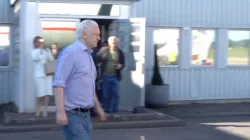Julian Assange, WikiLeaks founder, freed after striking plea deal with US in espionage case
Julian Assange appeared in a US federal court in the Mariana Islands, where he pleaded guilty to unlawfully obtaining classified national defense information. The US Justice Department confirmed his plea in a court-filed letter. As a result, Assange was granted release from prison.

WikiLeaks founder Julian Assange walked out of Belmarsh maximum security prison on Monday, following a plea deal with the US Department of Justice. Assange, who spent over five years in the British prison, agreed to plead guilty to violating US espionage laws. This deal allows him to return to his home country of Australia.
Details of release and departure
"Julian Assange is free. He left Belmarsh maximum security prison on the morning of 24 June, after having spent 1901 days there," WikiLeaks announced on X. Assange was granted bail by the High Court in London and released at Stansted Airport in the afternoon, where he boarded a plane and departed the UK.
Global support and negotiations
WikiLeaks expressed deep gratitude to its global supporters, stating, "This is the result of a global campaign that spanned grassroots organizers, press freedom campaigners, legislators, and leaders from across the political spectrum, all the way to the United Nations." The campaign and subsequent negotiations with the US Department of Justice led to the deal, which has not yet been formally finalized. WikiLeaks promised to provide more information soon.
Charges and historical context
Assange, 52, agreed to plead guilty to a single criminal count of conspiring to disclose classified US national defense documents. In 2010, WikiLeaks released thousands of classified US military documents related to the wars in Afghanistan and Iraq, marking one of the largest security breaches in US military history. The leaked documents included over 700,000 diplomatic cables and battlefield accounts.
Press freedom concerns
The charges against Assange sparked widespread outrage among his global supporters, with many press freedom advocates labelling the criminal charges as a threat to free speech.
Also read | North Korea resumes flying trash-filled balloons towards South Korea after Putin's meeting with Kim